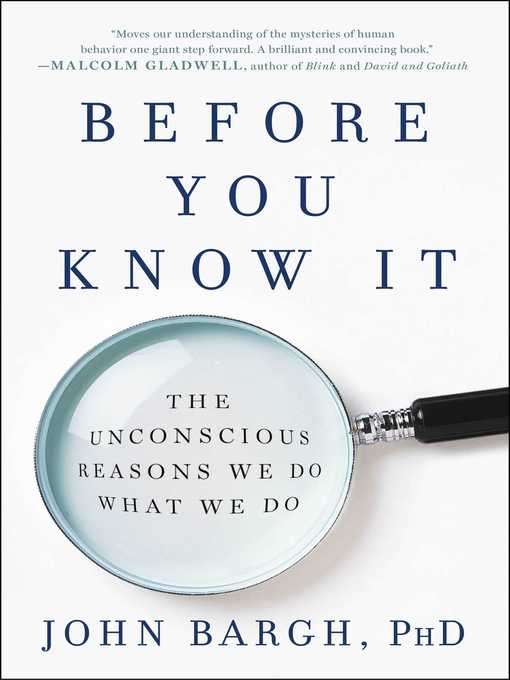
Before You Know It
The Unconscious Reasons We Do What We Do
- اطلاعات
- نقد و بررسی
- دیدگاه کاربران
نقد و بررسی

July 31, 2017
In this impressive debut, Bargh, a professor of social psychology at Yale University, dives deep into human behavior and social psychology to unlock the enigmatic human unconscious. This aspect of the mind, Bargh convincingly demonstrates, is more influential in daily life than we might think. The majority of the book is devoted to revealing and analyzing various unconscious factors on our emotions and actions. These range from the experience of holding a warm beverage—which studies have shown can lead to “warmer” feelings toward nearby people—to dreams, which often involve important life decisions. Bargh observes that even in infancy, before the brain can register memories, the unconsciousness is taking shape. Moving onto attachment theory, Bargh cites and explains ongoing research at the University of Minnesota into how we learn to trust and form relationships, based on how babies bond with their mothers. Elsewhere, he discusses how, depending on the circumstances, trusting unthinking “gut” reactions can either be lifesaving or life ending. In the final chapter, Bargh explores developing “mind control” over one’s own mind by better understanding how the unconscious works. He has assembled a fascinating compendium of landmark social-psychology research, both by himself and his colleagues. Bargh’s clear, accessible style will appeal to general readers and specialists alike.

September 1, 2017
Must humans be stupid and wrongheaded? Not if they take greater pains to shape their environments and understand what's going on inside their heads.The human mind lives in the past, present, and future all at once, writes Bargh (Psychology/Yale Univ.; co-editor: Oxford Handbook of Human Action, 2009, etc.), and it may not be trustworthy in any of those temporal dimensions. If we form decisions in less than the wink of an eye, our hidden assumptions, prejudices, and interpretations mean "that 'blink' responses are in fact considerably more fallible than many of us think." Sometimes those hidden aspects of mind are just this side of inexplicable; why, for instance, should someone who, fearing the flu, cleans his or her hands form a more positive view of immigration than someone whose hands remain unwashed? If anything, writes the author, such things suggest that we are wrong to think that "our thinking emerges only from rational principles and ideologies." As Bargh notes, given the monstrous thinking that so many children soak up from so many adults, it's a wonder that we can live in the world at all. It's refreshing that after so much biology-oriented neuroscience, the author isn't afraid to look at the nurture side of the nature/nurture divide. So it is that people can be trained to change their minds: to examine and retool biases and snap judgments as if acquiring a new good habit--no stretch there, for Bargh observes that just as smoking has been reduced by making environmental changes that make it harder to smoke, it's possible to alter environments to make people cultivate better habits of mind. "If you want to be less racist and sexist," he writes, "then use implementation intentions such as 'When I see a person of color, I will remind myself to be fair!' " That may seem a touch Pollyannaish, but it's backed by interesting science and experimental findings, all ably reported. Pop and academic science with a dose of self-help, all rolled up into a satisfying package.
COPYRIGHT(2017) Kirkus Reviews, ALL RIGHTS RESERVED.

September 15, 2017
Bargh, a psychology professor and director of Yale University's ACME (Automaticity in Cognition, Motivation, and Evaluation) Laboratory explores the age-old mystery of the relationship between the conscious and unconscious. How much of what we say, feel, and do is actually under our control? Bargh draws on theories from behaviorism and cognitive psychology in the past, and references material ranging from Sigmund Freud to studies of Otzi (one of the world's oldest mummies who lived around 3200 BCE) and Seinfeld. He has spent his career analyzing the power of human unconsciousness. Although the work is girded with years of studies and research, humor and use of personal anecdotes keep the writing accessible. Readers will finish the final chapter (helpfully entitled "You Have Mind Control") with new understanding of the authority of the unconscious but also armed with practical tips, based on that knowledge, to use free will to change themselves. VERDICT Readers of Angela Duckworth's Grit: The Power of Passion and Perseverance or Malcolm Gladwell's Blink: The Power of Thinking Without Thinking will definitely want to read this, as will anyone seriously interested in psychology and self-improvement. Highly recommended.--Elizabeth Safford, Boxford Town Lib., MA
Copyright 2017 Library Journal, LLC Used with permission.




دیدگاه کاربران